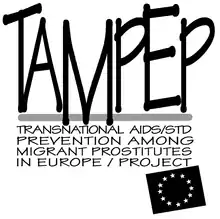TAMPEP
TAMPEP (European Network for HIV/STI Prevention and Health Promotion among Migrant Sex Workers) is an international organisation that supports the health and human rights of migrant sex workers in Europe.[2]
 A TAMPEP logo used in 2015 | |
| Formation | 1993 |
|---|---|
| Type | NGO |
| Legal status | foundation |
| Purpose | health and human rights of migrant sex workers |
| Headquarters | Amsterdam, Netherlands |
Region served | Europe |
General Coordinator | Licia Brussa[1] |
| Website | www |
History

Founded in 1993,[3] with headquarters in Amsterdam, the organisation initially operated in Italy, Austria, Germany, and the Netherlands. As of November 2019, it coordinates a network of 30 organisations[4] in 25 countries of the European Union, and receives funding from the European Commission as well as from national governmental and non-governmental organisations and has reached over 80 different nationalities throughout the years. As of November 2019, TAMPEP is hosted by Pro-tukipiste, a service provider organisation based in Helsinki, Finland.[4]
TAMPEP originally stood for 'Transnational AIDS/STD prevention amongst Migrant Prostitutes in Europe Project'; 'STD' was later changed to 'STI'.[3] The organisation has changed its self-description several times over the years: by 2004, it presented itself as the 'European Network for Transnational AIDS/STD Prevention among Migrant Prostitutes';[3] as of 2019, it calls itself the 'European Network for HIV/STI Prevention and Health Promotion among Migrant Sex Workers'.[4]
In 2017, TAMPEP was restructured into a migrant sex worker-led network that unites sex worker groups and allies in the fields of sex work, migration and health. The purpose of the network is to build stronger partnerships and to advocate for the rights and health of migrant and mobile sex workers at the European level.
Activities
The main concern of the project is HIV/AIDS prevention; it approaches the problem from a general health and human rights approach, working for empowerment and self-determination of female and transsexual migrant sex workers, and for improvements in their working conditions and social situation.[2][5] The member organisations employ street work, peer educators and informational materials to contact migrant sex workers.[6] The organisation produces regular reports about the situation of sex workers in Europe.
TAMPEP's literature emphasises the need to cleanly distinguish between the issues of trafficking, sex work and migration. TAMPEP opposes trafficking as a human rights abuse, but supports efforts to improve working conditions of sex workers and to facilitate migration.[1]
TAMPEP has also operated in Nigeria, where it helps to rehabilitate sex workers deported from Italy.[7]
References
- TAMPEP Position Paper on Migration and Sex Work (2002), retrieved 4 October 2009
- Margaret Ducket, Migrants' Right to Health, UNAIDS Best Practice Collection, March 2001
- Licia Brussa (ed.) (August 2004). "TAMPEP 6 report" (PDF). TAMPEP. Retrieved 5 November 2019.CS1 maint: extra text: authors list (link)
- "Members and Allies". TAMPEP website. Retrieved 5 November 2019.
- Brussa L, Migrant Sex workers in Europe: the experience of TAMPEP, 15th International Conference on AIDS, Bangkok Thailand 2004
- TAMPEP General Presentation, retrieved 4 October 2009
- Sengupta, Somini (5 November 2004). "Oldest Profession Is Still One of the Oldest Lures for Young Nigerian Women". The New York Times.